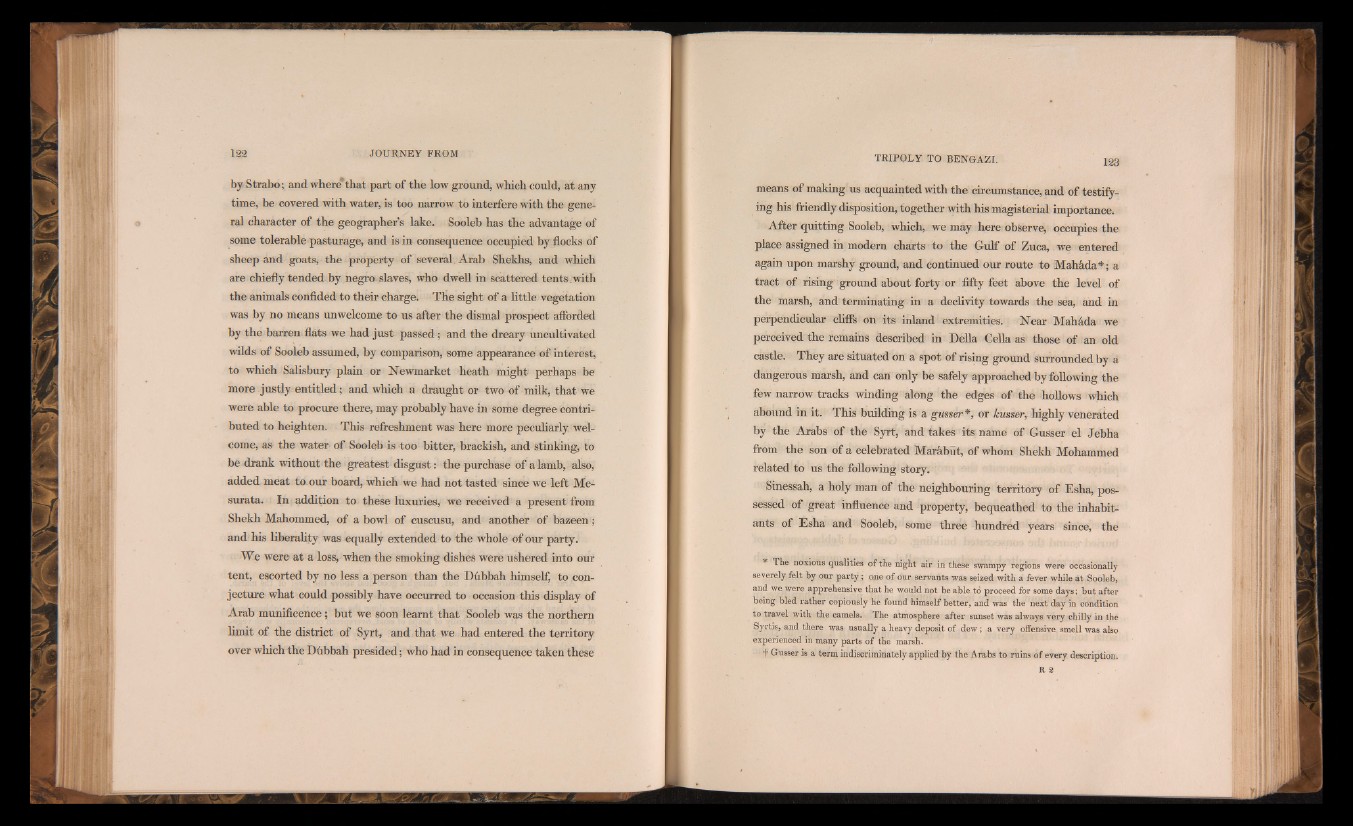
by Strabo; and where that part of the low ground, which could, at any
time, be covered with water, is too narrow to interfere with the general
character of the geographer’s lake. Sooleb has the advantage of
some tolerable pasturage, and is in consequence occupied by flocks of
sheep and goats, the property of several. Arab Shekhs, and which
are chiefly tended by negro slaves, who dwell in scattered tents , with
the animals confided to their charge. The sight of a little vegetation
was by no means unwelcome to us after the dismal prospect afforded
by the barren, flats we had just passed ; and the dreary uncultivated
wilds of Sooleb assumed, by comparison, some appearance of interest,
to which Salisbury plain or Newmarket heath might perhaps be
more justly entitled; and which a draught or two of milk, that we
were able to procure there, may probably have in some degree contributed
to heighten. This refreshment was here more peculiarly, welcome,
as the water of Sooleb is too bitter, brackish, and stinking, to
be drank without the greatest disgust: the purchase of a lamb, also,
added meat to our board, which we had not tasted since we left Me-
surata. In addition to these luxuries, we received a present from
Shekh Mahommed, of a bowl of cuscusu, and another of bazeen ;
and his liberality was equally extended to the whole of our party.
We were at a loss, when the smoking dishes were ushered into our
tent, escorted by no less a person than the Diibbah himself, to conjecture
what could possibly have occurred to occasion this display of
Arab munificence; but we soon learnt that Sooleb was the northern
limit of the district of Syrt, and that we had entered the territory
over which the Diibbah presided; who had in consequence taken these
means of making us acquainted with the circumstance, and of testifying
his friendly disposition, together with his magisterial importance.
After quitting Sooleb, which, we may here observe, occupies the
place assigned in modern charts to the Gulf of Zuca, we entered
again upon marshy ground, and continued our route to Mahhda*; a
tract of rising ground about forty or fifty feet above the level of
the marsh, and terminating in a declivity towards the sea, and in
perpendicular cliffs on its inland extremities. Near Mahdda we
perceived the remains described in Della Celia as those of an old
castle. They are situated on a spot of rising ground surrounded by a
dangerous marsh, and can only be safely approached by following the
few narrow tracks winding along the edges of the hollows which
abound in it. This building is a gusser*, or kusser, highly venerated
by the Arabs of the SyTt, and takes its name of Gusser el Jebha
from the son of a celebrated Marabut, of whom Shekh Mohammed
related to us the following story.
Sinessah, a holy man of the neighbouring territory of Esha, possessed
of great influence and property, bequeathed to the inhabitants
of Esha and Sooleb, some three hundred years since, the
* The noxious qualities of the night air in these swampy regions were occasionally
severely felt by our party; one of our servants was seized with a fever while at Sooleb,
and we. were apprehensive that he would not be able to proceed for some days; but after
being bled rather copiously he found himself better, and was the next day in condition
to travel with the camels. The atmosphere after sunset was always very chilly in the
Syrtis, and there was usually a heavy deposit of dew; a very offensive smell was also
experienced in many parts of the marsh.
f Gusser is a term indiscriminately applied by the Arabs to ruins of every description.